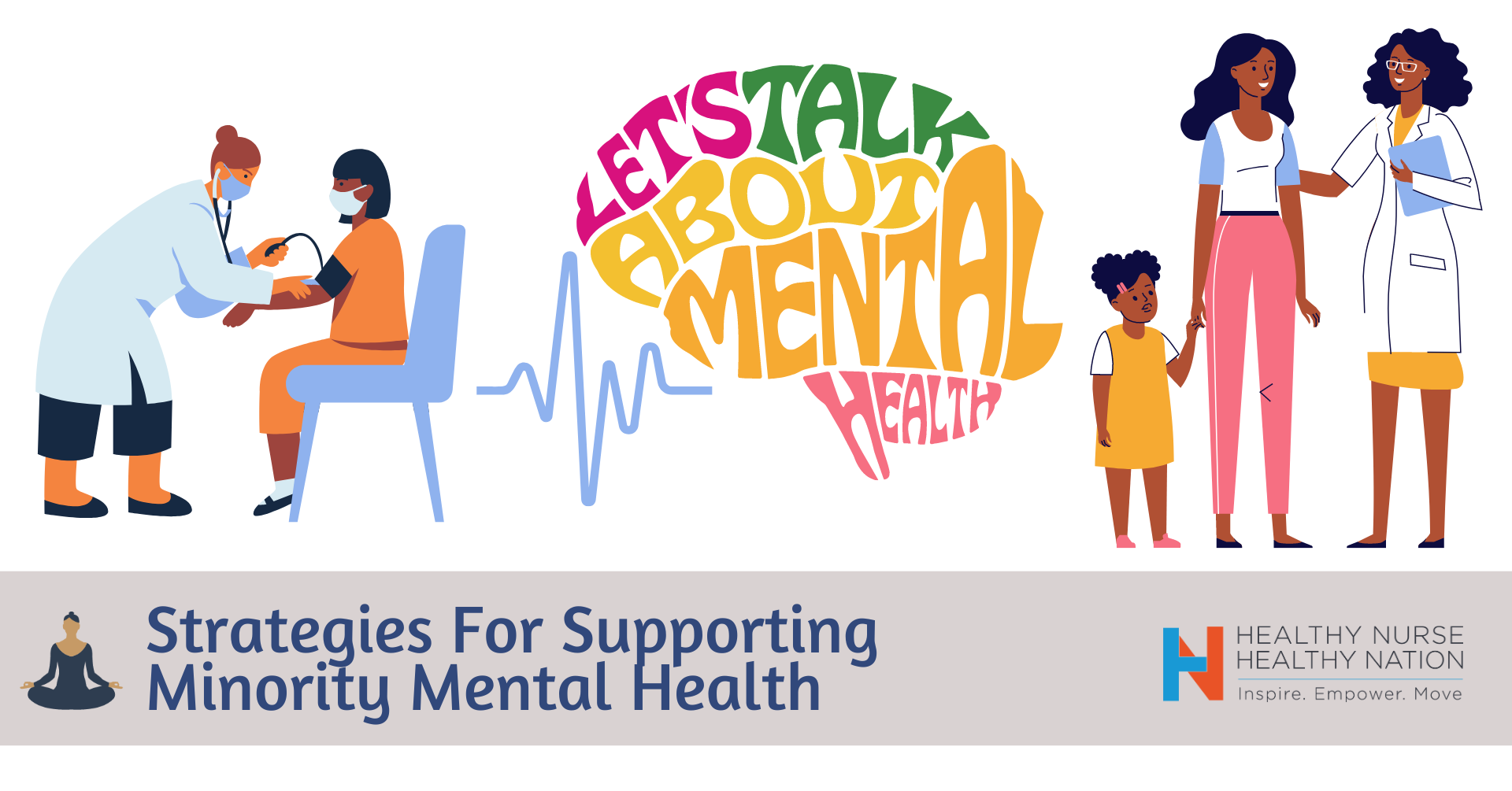Healthy Nurse, Healthy Nation™ Blog - Strategies For Supporting Minority Mental Health
Published
Staying mentally healthy is critical to physical health and quality of life. But the impact of mental health issues, and the ability to get the support and treatment needed, is not the same for everyone.
Approximately 26% of American adults live with mental health issues each year. According to a current survey conducted by the National Center for Health Statistics (NCHS) and the U.S. Census Bureau, a somewhat similar amount of white, Black, and Hispanic people reported recent symptoms of an anxiety or depressive disorder. But the American Psychiatric Association (APA) reports that Black and Hispanic people tend to experience longer-lasting depression.
The reason? Black, Indigenous, and people of color (BIPOC) communities don’t always get the mental health services they need. According to the APA, almost 50% of white people with mental illness receive health services, compared to 30% of Black and Hispanic people. The number is even lower for Asian communities.

The good news is that there are integrative health interventions that nurses can use to support the mental health of their BIPOC patients, says #healthynurse Udaya Thomas, PhD, MSN, MPH, APRN (pictured above). As a primary care integrative nurse practitioner and public health specialist, Udaya is an expert in integrative health and how those practices are making a difference in the mental health of minority populations. These interventions are intended to be used in addition to, rather than in place of, counseling, treatment, and medication prescribed by a licensed mental healthcare provider.
Udaya urges nurses to incorporate these 4 steps when providing mental health support for their patients — especially the BIPOC patients they serve:
- Identify Outside Influences on Mental Health
“Nurses are trained not to ask questions because they are curious but rather ask questions that may draw out answers and clues to improving the patient’s health and outcomes,” Udaya says. “The answers to certain personal and lifestyle questions can influence the direction of the mental health care that is offered.”
She recommends learning about your BIPOC patient’s:
ZIP code
Where a person lives and works can significantly affect their health outcomes. It reveals a patient’s access to fresh produce, green space, and what type of environmental hazards they experience at home or work.
Diet, exercise, and environmental toxins all affect mental health. The information provided by a ZIP code can help you determine a patient’s risk for mental illness. It might also guide lifestyle recommendations to help manage that risk.
Diet over the past 24 hours
Ask your patients what they ate during the last 24 hours. Their answer provides a snapshot of their diet, access to healthy food, and short-term memory.
“Our diet affects our emotional health as well as our physical health,” Udaya says. “And depression can show up as poor short-term memory.”
Exposure to trauma
Research shows that children in Black and Hispanic populations experience more trauma than white children. Adverse childhood experiences (ACEs) and the resulting stress often affect people throughout their lives. ACEs can change how the brain develops and how well a person handles stress, increasing the risk of depression and other mental health illnesses. Understanding a patient’s history with ACEs is helpful when assessing mental health.
“We need to empower nurses to first ask patients if they ever filled out an ACE questionnaire and if not share the resource with patients to fill out and share with their healthcare practitioner if they choose to do so,” Udaya says. “If they choose to share with their nurse, that’s great too as the nurse may be able to offer resources and patients may feel more comfortable sharing with the nurse. It’s a tool that can bring awareness that both the nurse and patient could act on.”
- Consider Epigenetics
- Directly, by changes occurring during your lifespan based on environmental toxins, lifestyle choices, and the things you experience
- Pre-delivery, based on events that occur during gestation or were passed from the father
- Across generations, as epigenetic changes are passed down through generations
“Preliminary evidence suggests that certain neurologic and psychiatric disorders, such as drug addiction, depression, and bipolar disorder, may be subject to epigenetic changes. Even schizophrenia can be linked to starvation in utero,” Udaya says. But because your DNA is unchanged, epigenetic changes aren’t always permanent. “When assessing mental health and how to treat it, we have to start looking not just at genetics, but at the epigenetic and cultural components that have been passed down.”
- Pay Attention to Breathing
“Learn about your patient’s lifestyle, and then watch how they breathe,” Udaya says. “It can give you a lot of clues about emotional regulation. How fast is their normal breathing pattern? Are they breathing from their chest or their belly?”
Assessing a patient’s breathing also provides an opportunity for teaching diaphragmatic breathing “or belly breathing”— how to use their diaphragm muscle to relieve stress and anxiety.
“Teaching belly breathing and breathwork is a great tool nurses can use to empower their patients to regulate their emotions,” Udaya says. “Show them that their breath makes a difference in their pulse rate and blood pressure.”
- Focus on Lifestyle Changes That Reduce Inflammation
The good news is that making healthy lifestyle changes can decrease inflammation and improve mental health. There are two lifestyle changes nurses can encourage with all of their patients:
Practicing mindfulness
Being aware and “in the moment” can reduce inflammation. Being mindful while eating and drinking is especially valuable. It can aid digestion, help with sleep, and lead to increased water intake.
Udaya recommends short meditations — even just 5 minutes daily — before eating. “Focus on the food and think about where it came from, how it grew, and how it got on your plate”.
“Digestion begins in the mouth,” Udaya says. “Once you’re eating mindfully, you’ll chew more slowly. You’ll be able to absorb the nutrients you need to enhance your mental balance and decrease inflammation. And as you pay attention to your food and listen to your body, you’ll naturally start choosing healthier options.”
Making dietary changes
According to Udaya, the diets that have the most impact on inflammation are not the ones you hear about on social media. They rely on a colorful and balanced diet of whole foods. Long-term dietary changes are what significantly impact overall health.
Diets that can help reduce inflammation include:
- Mediterranean diet, which encourages you to eat fruits, vegetables, whole grains, and healthy fats
- DASH (Dietary Approaches to Stop Hypertension) diet, which centers around eating fruits, vegetables, whole grains, and lean meats
- MIND (Mediterranean-DASH Intervention for Neurodegenerative Delay) diet, which is a combination of the Mediterranean and DASH diets
Acting Now to Improve Mental Health Outcomes Later
Understanding how to address mental health in BIPOC patients can help you connect with patients and provide them with improved quality of life. But taking these small steps can also promote a shift in mental health for years to come.
“When we incorporate these interventions for mindful health, they can help lower anxiety and depression in BIPOC communities,” Udaya says. “And we can start to view epigenetics from a protective lens. When you make healthy lifestyle changes and pass it on to your kids, it continues down the family line and can improve the health of future generations.”
Updated 5/7/25

Not a member of Healthy Nurse, Healthy Nation (HNHN) yet? Join today!
Sign up for our monthly challenges!
Blog Mental Health
06/29/2023 4:14pm CDT



Post a Comment or Question
Thank you Dr. Thomas for this insight!